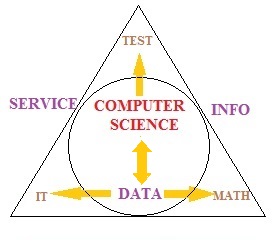Operating Systems
Homework Help & Tutoring
We offer an array of different online Operating Systems tutors, all of whom are advanced in their fields and highly qualified to instruct you.
Operating Systems
Most computer users have a favorite operating system for running applications. Whether it’s Microsoft, Apple, or a Unix/Linux distribution, the desired operating system represents a special place in today's IT world. But why is the operating system so important? This relevant question has a simple answer. Imagine two persons who each speak only one language - the first speaks hardware and the second speaks software. This situation would require a professional translator to properly interpret what each one is saying; especially if fast and efficient communication was the goal. We can make this the starting point for any discussion about operating systems. Although there exist certain differences in architecture and style, all serve to act as an interface between the end user and the device hardware itself. In pure technical terms, an operating system extends functionality of the Basic Input Output System (BIOS) and its components to a higher level of performance.
Today, one cannot imagine any device running without an operating system, including personal computers, servers, smart phones, or industrial equipment. The presence of an operating system is very important for any network involved in IT infrastructure. As these networks become more complex, there is a need for ever more complex operating systems to keep pace and successfully serve the ultimate purposes of business and personal communication.
College courses in operating systems normally deal with many of the following topics:
- Computer hardware architecture
- Interruption systems
- Operating system-specific features, functions, and evolution
- Operating system design studies
- Classifications of operating systems
- Running environments and algorithms
- Operating system application studies
System administrators view a Linux distribution as most suitable for servers in real-time systems. A Windows server kit matches with current virtualization techniques and offers many deployment possibilities. Regarding regular end user approaches, Windows represents by far the best choice, especially XP Professional SP3 x86 versions and x64 Windows 7, because of their stability, reliability, and suitability for game applications and graphics. For more experienced users not immersed in gaming and graphics, a Unix/Linux operating system will be preferable because all current Windows software has analogous Linux counterparts and in Linux it's easier to work directly with the system/kernel.
In the present enterprise environment, one of the biggest challenges involving operating systems is the concept of interconnecting different and heterogeneous devices. As a practical example, imagine a desktop running Windows, servers running both Windows and Linux (distributed model and also virtual machines), personal smart phones with Android accessing the network through a virtual private network, and other devices sharing the data (ATMs for banks, programmable logic controllers (PLCs) for industry, and cash registers for big stores). Good networks management involves deep knowledge of operating systems, together with advanced scripting/programming skills. The most important thing is to understand which model operating system best fits each case, and to maintain this protocol as long as conditions remain appropriate.
There is no better way to stay up to date in the field of operating systems than to read Operating Systems Review - a publication of SIGOPS, the Special Interest Group on Operating Systems. Don't forget MIT's fabulous OpenCourseWare, in this case, Operating System Engineering.
To fulfill our tutoring mission of online education, our college homework help and online tutoring centers are standing by 24/7, ready to assist college students who need homework help with all aspects of operating systaems. Our computer science tutors can help with all your projects, large or small, and we challenge you to find better online operating systems tutoring anywhere.
College Operating Systems Homework Help
Since we have tutors in all Operating Systems related topics, we can provide a range of different services. Our online Operating Systems tutors will:
- Provide specific insight for homework assignments.
- Review broad conceptual ideas and chapters.
- Simplify complex topics into digestible pieces of information.
- Answer any Operating Systems related questions.
- Tailor instruction to fit your style of learning.
With these capabilities, our college Operating Systems tutors will give you the tools you need to gain a comprehensive knowledge of Operating Systems you can use in future courses.
24HourAnswers Online Operating Systems Tutors
Our tutors are just as dedicated to your success in class as you are, so they are available around the clock to assist you with questions, homework, exam preparation and any Operating Systems related assignments you need extra help completing.
In addition to gaining access to highly qualified tutors, you'll also strengthen your confidence level in the classroom when you work with us. This newfound confidence will allow you to apply your Operating Systems knowledge in future courses and keep your education progressing smoothly.
Because our college Operating Systems tutors are fully remote, seeking their help is easy. Rather than spend valuable time trying to find a local Operating Systems tutor you can trust, just call on our tutors whenever you need them without any conflicting schedules getting in the way.






